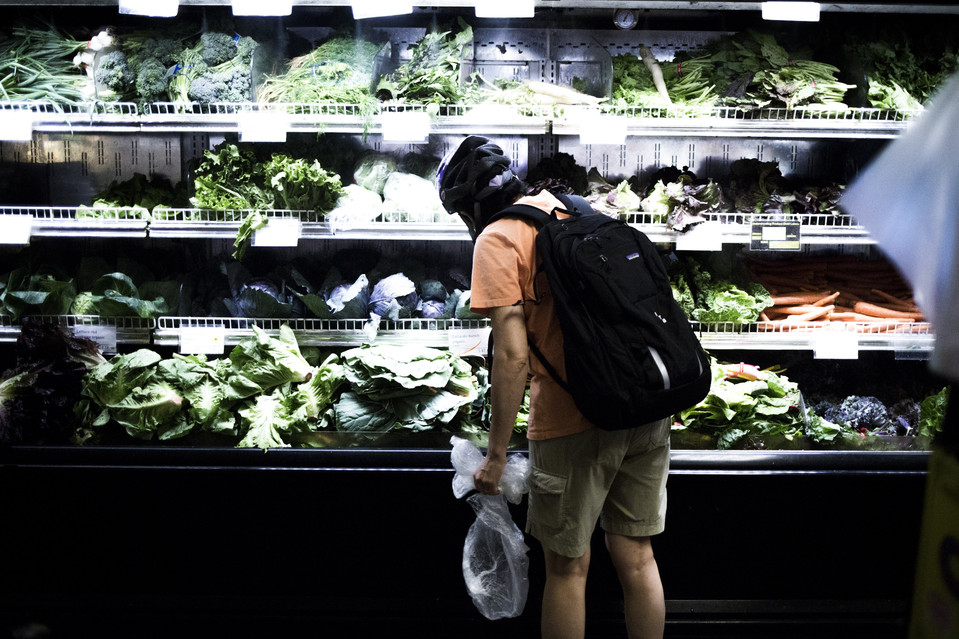Brooklyn may have the only grocery store in the country that puts its customers on trial.
The Park Slope Food Coop, founded in 1973, is a neighborhood institution known for its deadly serious dedication to organic produce and egalitarian values. Its 17,000 members are required to work 2¾ hours every four weeks in exchange for crunchy camaraderie and discounted groceries.
Over the years, the store has weathered its share of publicity for fighting over topics like the ethics of tuna harvesting. Recently, when one such dispute about Middle Eastern politics spiraled out of control, four members found themselves facing judgment before a jury of their peers, accused of being, well, uncooperative.
The co-op’s parallel criminal-justice system has its own peculiar lingo. Juries, dubbed “hearing and deciding groups,” are selected at random from the co-op membership. Members of a disciplinary committee build cases, which are presented by the “co-op advocate,” effectively a lead prosecutor. Judges are known as “hearing officers,” and the judicial process is overseen by a “hearing administration committee.”
Members caught in the crosshairs are given a choice: an arbitration, in essence a bench trial, or judgment by a jury of their peers. A writer from the Linewaiters’ Gazette, the co-op newspaper, serves as court reporter.
Such proceedings carry the mild title of “hearings.” Rhudi Andreolli, who stood accused in April of “extremely uncooperative behavior,” called it something else.
“It was a freaking trial,” she said.

Over the years, the store has weathered its share of publicity over membership disputes. PHOTO: JOHN TAGGART FOR THE WALL STREET JOURNAL
The trouble began in April 2015. According to the co-op’s formal complaint, Ms. Andreolli and three other members caused a 45-minute disruption during a discussion of whether the co-op should boycott sparkling-beverage company SodaStream International Ltd.
SodaStream, based in Israel, generated controversy at the co-op because it operated a plant in the West Bank. A company spokesman said it has since closed that West Bank factory. The co-op had battled earlier over whether to boycott other Israeli products, including hummus.
Ms. Andreolli and the other three co-op members were against the SodaStream boycott. The complaint alleged the four yelled “angry demands and sometimes hateful epithets,” got on stage to block photos from being seen, and one tried to disconnect a power cord to the projector. “More than one witness expressed concern for the physical safety of those most closely involved with the disrupting members,” the complaint said.
The accused didn’t dispute the allegations, but said they weren’t alone in protesting at the meeting and that the outburst was triggered by provocative photos depicting Israeli soldiers and Palestinians.

The trial of the four members was held in April in a meeting room on the second floor of the co-op. PHOTO: JOHN TAGGART FOR THE WALL STREET JOURNAL
Co-op leaders say the judicial system arose out of a need to resolve conflicts fairly, and that their administration of justice doesn’t carry real-world consequences.
“We don’t send people to jail,” said Park Slope Food Coop General Manager Joseph Holtz. “That’s not what’s at stake here.”
Infractions that could land one in court include theft, vandalism, falsifying work records, unauthorized presence in the basement and permitting nonmembers to shop. There have been seven hearings over the past two years, Mr. Holtz said.
The prosecutors’ investigation of Ms. Andreolli and the other three members included interviews with more than a dozen witnesses, photographs and an audio recording of the meeting, the complaint said.
“Your case will be heard and you will have the opportunity to dispute the specific facts of the case by providing evidence to disprove the allegations against you,” the complaint said. It was signed, “In cooperation.”
Pretrial correspondence mirrored that of the real legal system. A lawyer for the defendants wrote a “discovery demand” letter, a reference to the evidence that would be allowed. The defendants protested being suspended before being formally convicted, citing due process.
The trial was held in April in the meeting room on the second floor of the co-op.

Millie Ruttner and Al Ettlinger were found guilty. They now have to shop elsewhere.PHOTOS: JOHN TAGGART FOR THE WALL STREET JOURNAL
After several hours that included testimony from witnesses, the jury found the four defendants guilty of the first charge—“disrupting or obstructing Coop activities”—and acquitted them of the second, “physical or verbal conduct which threatens or endangers the health and safety of another person in connection with Coop activities.”
The judge handed down the sentence: one-year banishment from co-op premises.
“A guy that just committed rape on some college campus got six months, and I got a year,” griped Al Ettlinger, 79 years old, an artist and jewelry maker who has been a co-op member for 25 years. Member Millie Ruttner, 65, who also was convicted, called the proceedings a “kangaroo court.” The co-op manager said the organization has worked to be as fair as possible.
Some members say such proceedings aren’t representative of their beloved grocery store.
The co-op isn’t “a hippie-conspiracy trial at all times,” said Toby Vann, 52, who said he designs domes, including one for the cultural festival Burning Man. “It’s just people who like to eat good food.”
On a recent afternoon, a visitor who tried to enter the co-op was told all nonmembers must be supervised. An escort led her through narrow aisles of organic produce, bulk bins and shelves of haphazardly stacked natural products.
“There’s only one sad-looking eggplant on the floor,” a voice intoned over a loudspeaker.
The four suspended members are learning to get by on what they consider inferior groceries. Ms. Ruttner shops at Trader Joe’s. Mr. Ettlinger goes to Key Food.



